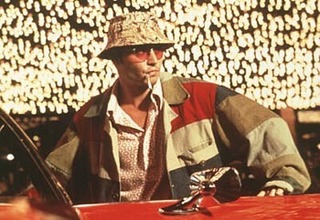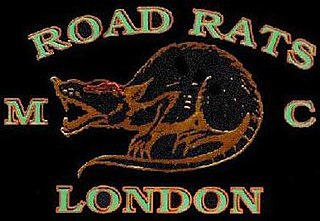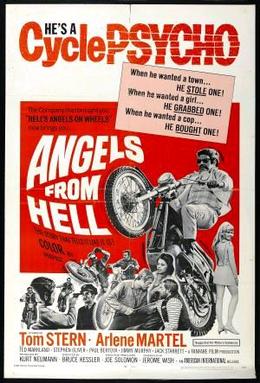
Hunter Stockton Thompson was an American journalist and author. He rose to prominence with the publication of Hell's Angels (1967), a book for which he spent a year living with the Hells Angels motorcycle club to write a first-hand account of their lives and experiences. In 1970, he wrote an unconventional article titled "The Kentucky Derby Is Decadent and Depraved" for Scanlan's Monthly, which further raised his profile as a countercultural figure. It also set him on the path to establishing his own subgenre of New Journalism that he called "Gonzo", a journalistic style in which the writer becomes a central figure and participant in the events of the narrative.

Ralph Hubert "Sonny" Barger Jr. was an American outlaw biker who was a founding member of the Oakland, California chapter of the Hells Angels Motorcycle Club in 1957. After forming the Oakland chapter, Barger was instrumental in unifying various disparate Hells Angels chapters and had the club incorporated in 1966. He emerged as the Hells Angels' most prominent member during the counterculture era and was reputed by law enforcement and media to be the club's international president, an allegation he repeatedly denied. The author Hunter S. Thompson called Barger "the Maximum Leader" of the Hells Angels, and Philip Martin of the Phoenix New Times described him as "the archetypical Hells Angel", saying he "didn't found the motorcycle club ... but he constructed the myth". He authored five books, and appeared on television and in film.

Raoul Duke is the partially fictionalized author surrogate character and sometimes pseudonym used by Hunter S. Thompson as the main character and antihero for many of his works. He is perhaps best known as the narrator for his 1971 autobiographical novel Fear and Loathing in Las Vegas. The book was originally written under the name Raoul Duke. The character wears a bucket hat and yellow tinted aviator glasses.

An outlaw motorcycle club, known colloquially as a biker gang or motorcycle gang, is a motorcycle subculture generally centered on the use of cruiser motorcycles, particularly Harley-Davidsons and choppers, and a set of ideals that purport to celebrate freedom, nonconformity to mainstream culture, and loyalty to the biker group.

Hells Angels on Wheels is a 1967 American biker film directed by Richard Rush, and starring Adam Roarke, Jack Nicholson, and Sabrina Scharf. The film tells the story of a gas-station attendant with a bad attitude who finds life more exciting after he is allowed to hang out with a chapter of the Hells Angels outlaw motorcycle club.

Fear and Loathing in Las Vegas is a 1998 American stoner road black comedy film adapted from Hunter S. Thompson's 1971 novel of the same name. It was co-written and directed by Terry Gilliam, and stars Johnny Depp and Benicio del Toro as Raoul Duke and Dr. Gonzo, respectively. The film details the duo's journey through Las Vegas as their initial journalistic intentions devolve into an exploration of the city under the influence of psychoactive substances.

Fear and Loathing in Las Vegas: A Savage Journey to the Heart of the American Dream is a 1971 novel in the gonzo journalism style by Hunter S. Thompson. The book is a roman à clef, rooted in autobiographical incidents. The story follows its protagonist, Raoul Duke, and his attorney, Doctor Gonzo, as they descend on Las Vegas to chase the American Dream through a drug-induced haze, all the while ruminating on the failure of the 1960s countercultural movement. The work is Thompson's most famous book and is noted for its lurid descriptions of illicit drug use and its early retrospective on the culture of the 1960s. Thompson's highly subjective blend of fact and fiction, which it popularized, became known as gonzo journalism. Illustrated by Ralph Steadman, the novel first appeared as a two-part series in Rolling Stone magazine in 1971 before being published in book form in 1972. It was later adapted into a film of the same title in 1998 by director Terry Gilliam, starring Johnny Depp and Benicio del Toro, who portrayed Raoul Duke and Dr. Gonzo, respectively.
The outlaw biker film is a film genre that portrays its characters as motorcycle riding rebels. The characters are usually members of an outlaw motorcycle club.

Fear and Loathing in America: The Brutal Odyssey of an Outlaw Journalist 1968–1976 is a collection of hundreds of letters Hunter S. Thompson wrote after his rise to fame with his 1966 hit Hell's Angels: The Strange and Terrible Saga of the Outlaw Motorcycle Gangs. These letters deal primarily with Thompson and his editor at Random House, Jim Silberman, his correspondence with Oscar Zeta Acosta, and his perpetually fluctuating relationship with Jann Wenner, the founder of Rolling Stone.

Harry Joseph Bowman, also known as "Taco", was an American outlaw biker and gangster who served as the international president of the Outlaws Motorcycle Club between 1984 and 1999. During his tenure as president, the club had chapters in more than 30 cities in the United States and some 20 chapters in at least four other countries.
Bibliography of works by American author and journalist Hunter S. Thompson.

The Hells Angels Motorcycle Club (HAMC) is an international outlaw motorcycle club whose members typically ride Harley-Davidson motorcycles. In the United States and Canada, the Hells Angels are incorporated as the Hells Angels Motorcycle Corporation. Common nicknames for the club are the "H.A.", "Red & White", "HAMC", and "81". With a membership of over 6,000, and 467 chapters in 59 countries, the HAMC is the largest "outlaw" motorcycle club in the world.
Fear and Loathing on the Road to Hollywood, also known as Fear and Loathing in Gonzovision, is a documentary film produced by BBC Omnibus in 1978 on the subject of Hunter S. Thompson, directed by Nigel Finch.

Galloping Goose Motorcycle Club (GGMC) is a motorcycle club that began around a motorcycle racing team and friends based out of Los Angeles, California in the United States in 1942. The group was informal and not chartered until 1946. Soon after, the organization spread out from southern California, establishing chapters in Illinois, Missouri, Montana, Indiana, Wyoming, Kansas, Mississippi, Louisiana and Florida.

The Road Rats Motorcycle Club (RRMC) is an English outlaw motorcycle club established in London in the 1960s. Arguably one of the "oldest and toughest motorcycle clubs in the country", the Road Rats are notorious for having fallen out with almost every motorcycle club in the United Kingdom and a few outside of the UK. The club became notable for its clashes with the English Hells Angels chapter, including a shooting on Chelsea Bridge, the Satans Slaves, in which two Road Rats were killed, and for murdering one of the founders of the Cycle Tramps motorcycle gang.

Angels from Hell is a 1968 biker film directed by Bruce Kessler and starring Tom Stern and Arlene Martel. It was the first film produced by Joe Solomon's Fanfare Films, a firm Solomon had created with the profits from three previous biker films. The film was shot in Bakersfield, California. The screenplay was written by Jerome Wish, and the film used music by The Peanut Butter Conspiracy and The Lollipop Shoppe. Sonny Barger, president of the Oakland, California chapter of the Hells Angels, is credited as story consultant.
Hell's Angels '69 is a 1969 Outlaw biker film directed by Lee Madden and Conny Van Dyke. The film stars Tom Stern, Jeremy Slate, Conny Van Dyke, and Steve Sandor.

Michael Vincent O'Farrell, nicknamed "Irish", was an American outlaw biker and gangster who served as the vice-president and acting president of the Oakland, California, chapter of the Hells Angels Motorcycle Club (HAMC). O'Farrell was alleged by law enforcement officials to be the second-in-command to Sonny Barger, the reputed international president of the Hells Angels. During the early-mid 1980s, he deputized for Barger, serving as the Oakland chapter president and de facto international leader of the Hells Angels, while Barger recovered from a throat operation for cancer. O'Farrell was murdered in a bar fight in 1989 shortly before he was due to start serving a prison sentence for conspiring to bomb the clubhouse of a rival motorcycle gang, the Outlaws.

Numerous police and international intelligence agencies classify the Hells Angels Motorcycle Club as a motorcycle gang and contend that members carry out widespread violent crimes, including drug dealing, trafficking in stolen goods, gunrunning, extortion, and prostitution rings. Members of the organization have continuously asserted that they are only a group of motorcycle enthusiasts who have joined to ride motorcycles together, to organize social events such as group road trips, fundraisers, parties, and motorcycle rallies, and that any crimes are the responsibility of the individuals who carried them out and not the club as a whole.

The Dirty Dozen Motorcycle Club (DDMC) was an outlaw motorcycle club in Arizona. Founded in 1964, the Dirty Dozen became the preeminent motorcycle gang in the state, and ultimately merged with the Hells Angels in 1997.
















